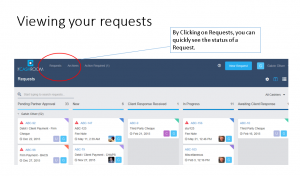Does your firm have a plan for its future?
At The Cashroom, we have recently started extensive training programmes for our ‘Rising Stars’ and ‘Future Leaders’. The initiative is aimed at identifying key people for the future success of the business, and to start developing them to ensure they are able to perform and thrive when the time comes to step up the ladder. It made me think about my time in practice as a Solicitor, and the fact that I never came across any such deliberate and  detailed plan for the future. Sure, there were appraisals and performance reviews which set goals, and identified areas for improvement, but they were concerned more with performing better in your current role, rather than planning and preparing for future roles, and areas of interest. Have a think for moment – does your firm have a plan for developing its key people for the future?
detailed plan for the future. Sure, there were appraisals and performance reviews which set goals, and identified areas for improvement, but they were concerned more with performing better in your current role, rather than planning and preparing for future roles, and areas of interest. Have a think for moment – does your firm have a plan for developing its key people for the future?
I deliberately say key ‘people’ because although you must plan for the future ownership of the business via the next batch of Partners, it is just as crucial that you plan for key staff, and older Partners too. The partnership agreement may provide a set retirement age, but retaining people as Consultants or Ambassadors for the firm beyond that may be crucial for retaining certain longstanding clients who have worked with that person for many years. Equally, Paralegals or Support Staff may have the deepest understanding of certain clients, or may be the ones who are in regular contact with them on an ongoing basis.
When developing these key people for the future, it is also crucial to find out what they want and aim for in their working lives. When was the last time you asked your staff what their career aspirations were? There are many reasons to do so – for starters, if you can’t offer what they are aiming for, they will leave at some point, and you need to know that. Secondly, the future wellbeing of your firm will need people to take care of the different areas of the business – not just the practice of law – so you need to find out if you have people who have an interest in being, for example, ‘Business Development Partner/Manager/Director’, ‘Client Relations/Complaints Partner’, ‘Cashroom Manager / COLP / COFA’, or ‘Managing Partner’. It is important to find and develop these people over a period of time, and also to think about these role specifications clearly so you are not setting people up for a fall. All too often, particularly the role of Managing Partner, is given to somebody without enough regard for whether they are the best person for the role, what the firm expects of them by way of splitting their time between fee earning and management commitments and, crucially, any sort of plan as to how they would return to a full time fee earning Partner role thereafter.
 So, perhaps there is some food for thought here for discussion at your next Partners meeting. Do you have the same people in mind to take over the reins, and how are you going to equip them with the skills to do so? I would suggest putting a realistic plan together, with clear and achievable objectives, put it in to practice as soon as possible, and keep in regular dialogue with the people involved. They will likely be motivated by the opportunity, bringing better engagement immediately, and more seamless business continuity and succession into the future.
So, perhaps there is some food for thought here for discussion at your next Partners meeting. Do you have the same people in mind to take over the reins, and how are you going to equip them with the skills to do so? I would suggest putting a realistic plan together, with clear and achievable objectives, put it in to practice as soon as possible, and keep in regular dialogue with the people involved. They will likely be motivated by the opportunity, bringing better engagement immediately, and more seamless business continuity and succession into the future.
Gregor Angus, Senior Business Development Manager
The Cashroom Ltd

 We do not have a ‘system’ or software that we use, we simply access the accounts part of your existing Practice Management System remotely. So, all you need is a legal practice management system of some sort, and a means of us accessing it remotely. We also have a secure client portal which all of our clients are on, creating a secure environment for both The Cashroom and client to communicate without the cyber risks of email. This also avoids having to protect sensitive data via email. Training can also be given to ensure you are comfortable when using the portal.
We do not have a ‘system’ or software that we use, we simply access the accounts part of your existing Practice Management System remotely. So, all you need is a legal practice management system of some sort, and a means of us accessing it remotely. We also have a secure client portal which all of our clients are on, creating a secure environment for both The Cashroom and client to communicate without the cyber risks of email. This also avoids having to protect sensitive data via email. Training can also be given to ensure you are comfortable when using the portal. We allocate each client to a cashiering team, headed up by a very experienced senior cashier, essentially your ‘Head Cashier’. They will have a small team of people who will work with your firm, in order that holidays, sickness cover etc, are not a problem for you. You will get to know the two or three people working with your firm very quickly, and build a relationship with them. You can pick up the phone or send a query via our secure client portal to these selected people at any point and be ensured that someone will always be about to help.
We allocate each client to a cashiering team, headed up by a very experienced senior cashier, essentially your ‘Head Cashier’. They will have a small team of people who will work with your firm, in order that holidays, sickness cover etc, are not a problem for you. You will get to know the two or three people working with your firm very quickly, and build a relationship with them. You can pick up the phone or send a query via our secure client portal to these selected people at any point and be ensured that someone will always be about to help. addressing. According to research 66% of solicitors feel high levels of stress in their jobs, and each year in the UK, 70 million workdays are lost to mental illness.
addressing. According to research 66% of solicitors feel high levels of stress in their jobs, and each year in the UK, 70 million workdays are lost to mental illness. Almost half of all the calls received (48%) were made by legal professionals with less than five years’ qualified experience. The Junior Lawyers Division’s resilience and well-being survey also found a huge number of younger legal professionals struggling with work related mental health issues. This research clearly shows that the well-being of people in the legal sector spans all knowledge ranges and doesn’t discriminate between the newly qualified and the more experienced lawyer.
Almost half of all the calls received (48%) were made by legal professionals with less than five years’ qualified experience. The Junior Lawyers Division’s resilience and well-being survey also found a huge number of younger legal professionals struggling with work related mental health issues. This research clearly shows that the well-being of people in the legal sector spans all knowledge ranges and doesn’t discriminate between the newly qualified and the more experienced lawyer.
 I recently ran Manchester marathon. I wasn’t fast, and I wasn’t last – 3hr 31 min to be precise – but sometimes the time is irrelevant . I ran a marathon in 2014 (Edinburgh) and have run the distance a few more times at the end of Ironman triathlons (pre-– children!), but this time around was a little different. I haven’t slept much in the last few months (see earlier reference to children!), and had a busy few months at work and at home, so training was ‘minimalistic’ to say the least. However, aside from a ‘moment’ a few weeks before race day, I knew that I could get round alright. It wouldn’t be a PB, but I would complete the distance. And that’s when I realised that something had changed in the last few years – my perspective. Being able to run a marathon on minimal training was now my ‘new normal’, and I think there is a lesson in that: what you perceive as your ‘normal’ can vastly change over time, and your limits are almost certainly not where you think they are.
I recently ran Manchester marathon. I wasn’t fast, and I wasn’t last – 3hr 31 min to be precise – but sometimes the time is irrelevant . I ran a marathon in 2014 (Edinburgh) and have run the distance a few more times at the end of Ironman triathlons (pre-– children!), but this time around was a little different. I haven’t slept much in the last few months (see earlier reference to children!), and had a busy few months at work and at home, so training was ‘minimalistic’ to say the least. However, aside from a ‘moment’ a few weeks before race day, I knew that I could get round alright. It wouldn’t be a PB, but I would complete the distance. And that’s when I realised that something had changed in the last few years – my perspective. Being able to run a marathon on minimal training was now my ‘new normal’, and I think there is a lesson in that: what you perceive as your ‘normal’ can vastly change over time, and your limits are almost certainly not where you think they are. You don’t need to go in all guns blazing, signing up to climb Mount Everest next week, but decide what it is you want to achieve, and start taking small, incremental but consistent steps towards it, building momentum as you go. Those daily, weekly or monthly steps towards the goal, over time, are what make the difference. Once you have that consistent practice, what once seemed like a pie in the sky idea will come clearly into view, and be more than achievable. And once achieved, your perspective will have changed, in a positive way, forever. Even if your goal was to start a new business, and it wasn’t ultimately successful, going through the process, and making that your ‘new normal’, will change your outlook, and help you believe that it is not beyond your capabilities should a better opportunity arise in the future.
You don’t need to go in all guns blazing, signing up to climb Mount Everest next week, but decide what it is you want to achieve, and start taking small, incremental but consistent steps towards it, building momentum as you go. Those daily, weekly or monthly steps towards the goal, over time, are what make the difference. Once you have that consistent practice, what once seemed like a pie in the sky idea will come clearly into view, and be more than achievable. And once achieved, your perspective will have changed, in a positive way, forever. Even if your goal was to start a new business, and it wasn’t ultimately successful, going through the process, and making that your ‘new normal’, will change your outlook, and help you believe that it is not beyond your capabilities should a better opportunity arise in the future. So, while I would encourage you all to run a marathon – I truly believe anyone can do it with the right preparation and dedication to training – your goal may be something quite different to that. The same principles apply though: identify what it is you want to achieve, commit to it, then train for it in a deliberate and consistent way. Very philosophical I know, but life is short, so set about doing the things you have always wanted to do. And remember, nothing changes if nothing changes.
So, while I would encourage you all to run a marathon – I truly believe anyone can do it with the right preparation and dedication to training – your goal may be something quite different to that. The same principles apply though: identify what it is you want to achieve, commit to it, then train for it in a deliberate and consistent way. Very philosophical I know, but life is short, so set about doing the things you have always wanted to do. And remember, nothing changes if nothing changes. extremely busy and sometime stressful work we all have commitments and strains to deal with in our personal life too. It is vital for all of us to take a step back when needed and deal with our own health. And even if we do not have any existing mental health problems, ensure that we are all looking after our mental health as we do our physical health.
extremely busy and sometime stressful work we all have commitments and strains to deal with in our personal life too. It is vital for all of us to take a step back when needed and deal with our own health. And even if we do not have any existing mental health problems, ensure that we are all looking after our mental health as we do our physical health. At The Cashroom we have a confidential phone line available to staff which goes to trained mental health professionals that they can call 24 hours a day (you wouldn’t let yourself or even a colleague treat your cancer would you?).The Mindful Employer creates a safe place for staff to call and also has a lot of useful information on its website for staff. We also encourage all staff to look after their mental wellbeing by allowing time during the working day for staff to complete a daily mile outside in the fresh air and we have fresh fruit delivered weekly. We also have our mental health charter displayed in the office for staff to see.
At The Cashroom we have a confidential phone line available to staff which goes to trained mental health professionals that they can call 24 hours a day (you wouldn’t let yourself or even a colleague treat your cancer would you?).The Mindful Employer creates a safe place for staff to call and also has a lot of useful information on its website for staff. We also encourage all staff to look after their mental wellbeing by allowing time during the working day for staff to complete a daily mile outside in the fresh air and we have fresh fruit delivered weekly. We also have our mental health charter displayed in the office for staff to see. legal news. Today I was really struck by how Tech focussed the profession is becoming – gone is the image of the lawyer surrounded by paper and difficult to get in touch with.
legal news. Today I was really struck by how Tech focussed the profession is becoming – gone is the image of the lawyer surrounded by paper and difficult to get in touch with.
 We have been developing our very own portal, it is a secure method for clients to send their instructions to us and both organisations benefit from a full audit trail, it is extremely user friendly.
We have been developing our very own portal, it is a secure method for clients to send their instructions to us and both organisations benefit from a full audit trail, it is extremely user friendly. CLT Scotland are now offering e-learning CPD -you can now gain the necessary CPD hours by fitting it into your own schedule, you could even do it from home wearing your pyjamas (if you wished!) Topics include the Criminal Justice (Scotland) Act 2016, powers of attorney and social media law. I really think that CPD without having to leave your desk is a great idea.
CLT Scotland are now offering e-learning CPD -you can now gain the necessary CPD hours by fitting it into your own schedule, you could even do it from home wearing your pyjamas (if you wished!) Topics include the Criminal Justice (Scotland) Act 2016, powers of attorney and social media law. I really think that CPD without having to leave your desk is a great idea.